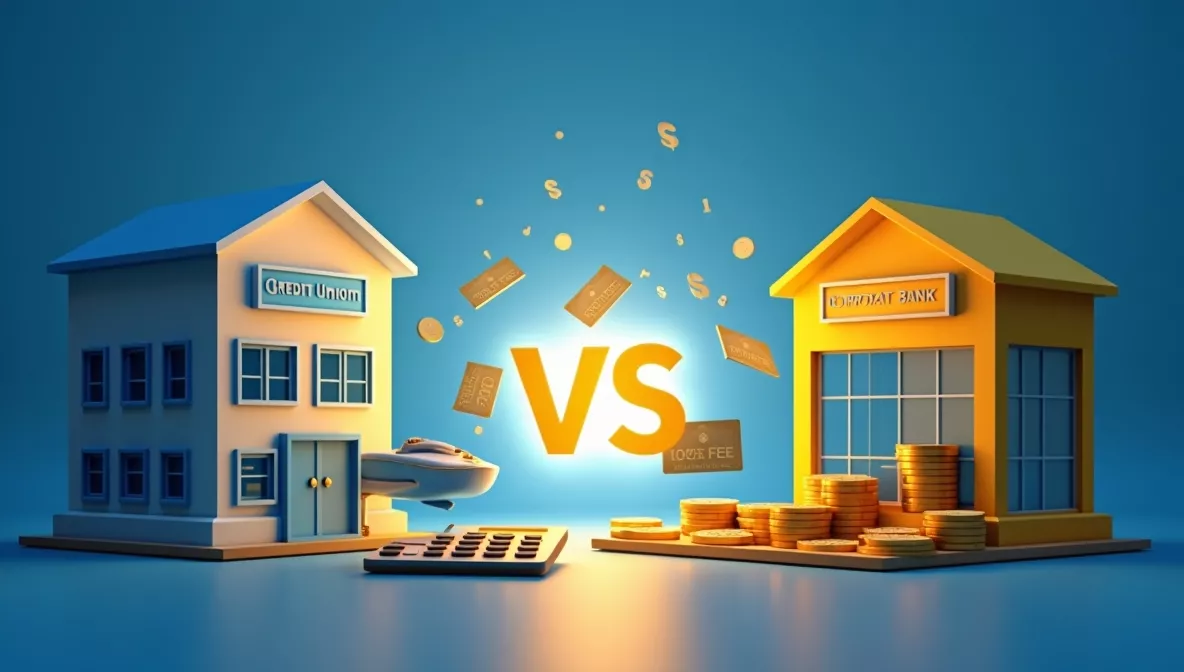You’re staring at your wallet right now wondering if that shiny bank credit card is actually screwing you over.
- The Brutal Truth About Banks vs Credit Unions
- Interest Rates: Where Your Money Goes to Die (Or Doesn’t)
- Why Credit Union Rates Are Lower
- 💖 You Might Also Like
- Fees: The Silent Wealth Killer
- Credit Limits: How Much Rope They Give You
- Rewards Programs: Where Banks Actually Win
- ✨ More Stories for You
- Customer Service: Night and Day Difference
- Approval Requirements: Who Gets In
- Technology and Apps: Where Banks Shine
- 🌟 Don't Miss These Posts
- Security and Fraud Protection
- When to Choose a Credit Union Card
- When to Choose a Bank Card
- My Personal Strategy
- How to Switch (If You Want To)
- FAQs About Credit Union vs Bank Credit Cards
- Do credit unions have worse credit cards than banks?
- Can anyone join a credit union?
- Are credit union credit cards harder to get approved for?
- Do credit union cards work everywhere bank cards do?
- Can I get rewards with credit union cards?
- Are credit union cards safer than bank cards?
- Should I close my bank card if I get a credit union card?
- The Bottom Line on Credit Union vs Bank Credit Cards
Maybe your friend just got approved for some credit union card with a crazy low interest rate.
And now you’re thinking – what’s the real difference here?
I’ve been there.
Let me break this down without the banking BS.
The Brutal Truth About Banks vs Credit Unions
Here’s what nobody tells you:
Banks are businesses. Credit unions are member-owned cooperatives.
That’s not just fancy talk. It changes everything.
Banks want profit. Credit unions want to help members.
Simple as that.
Interest Rates: Where Your Money Goes to Die (Or Doesn’t)
This is where credit unions absolutely crush banks.
I’m talking 7-12% APR vs 15-25% APR.
That’s not a typo.
Let’s do some quick math:
- You carry a $5,000 balance
- Bank card at 18% APR = $900 in interest per year
- Credit union card at 9% APR = $450 in interest per year
- You just saved $450 by switching
That’s rent money for some people.
Why Credit Union Rates Are Lower
They’re not trying to make shareholders rich. They’re trying to help you. Period.
Banks need to hit profit targets. Credit unions need to serve members.
Guess which one gives you better rates?
💖 You Might Also Like
Fees: The Silent Wealth Killer
Banks love fees. Like, really love them.
Common bank credit card fees:
- Annual fees: $0-$695
- Late payment fees: $29-$40
- Over-limit fees: $25-$35
- Cash advance fees: 3-5%
- Foreign transaction fees: 2.5-3%
Credit union fees are typically:
- Lower annual fees (many $0)
- Reduced late payment fees
- Often no over-limit fees
- Lower cash advance fees
- Better foreign transaction terms
I switched from Bank of America to my local credit union. My late fee went from $35 to $15. My cash advance fee dropped from 5% to 2.5%.
Small numbers add up fast.
Credit Limits: How Much Rope They Give You
Banks might approve you faster. But credit unions often give better limits to qualified members.
Here’s the thing: Credit unions look at your whole relationship. Your checking account. Your savings. Your loan history.
Banks just run algorithms.
Pro tip: If you’ve been with a credit union for years, they might surprise you with a higher limit than a bank would offer.
Rewards Programs: Where Banks Actually Win
I hate admitting this. But banks crush credit unions on rewards.
Bank rewards are insane:
- 2% cash back on everything
- 5% rotating categories
- Travel rewards that actually matter
- Sign-up bonuses worth $200-$800
Credit union rewards are… meh:
- Usually 1% cash back
- Limited category bonuses
- Smaller sign-up bonuses
If you pay your balance in full every month, bank rewards might be worth it. If you carry balances, those low credit union rates win every time.
✨ More Stories for You
Customer Service: Night and Day Difference
Credit union service is personal. Bank service is… not.
Credit union experience:
- You know people’s names
- They know your situation
- Flexible when life happens
- Local decision-making
Bank experience:
- Call centers in different countries
- Script-reading robots
- Rigid policies
- Corporate bureaucracy
My credit union called me when they noticed unusual spending. Not to block my card. To make sure I was okay.
Try getting that from Wells Fargo.
Approval Requirements: Who Gets In
Banks approve based on:
- Credit score
- Income
- Debt-to-income ratio
- Algorithm says yes/no
Credit unions consider:
- All the above PLUS
- Your relationship history
- Local ties
- Human judgment
I’ve seen credit unions approve people banks rejected. Because they looked beyond the numbers.
Technology and Apps: Where Banks Shine
Banks dump millions into apps. Credit unions… don’t.
Bank tech advantages:
- Slick mobile apps
- Real-time notifications
- Advanced budgeting tools
- Instant everything
Credit union tech is:
- Often outdated
- Limited features
- Slower updates
- Basic functionality
If you live on your phone, this matters. If you don’t, it doesn’t.
🌟 Don't Miss These Posts
Security and Fraud Protection
Both are solid here. FDIC vs NCUA insurance. Same $250,000 protection.
Banks might have slightly faster fraud detection. Credit unions give more personal attention to fraud cases.
Pick your poison.
When to Choose a Credit Union Card
Choose credit unions if you:
- Carry balances month to month
- Want lower fees
- Prefer personal service
- Live in their service area
- Value community banking
Perfect for: People who struggle with debt, want lower costs, prefer relationships over features.
When to Choose a Bank Card
Choose banks if you:
- Pay balances in full monthly
- Want maximum rewards
- Need cutting-edge apps
- Travel internationally often
- Don’t care about personal service
Perfect for: Rewards optimizers, tech lovers, frequent travelers, people who never carry balances.
My Personal Strategy
I use both. Credit union card for emergencies (low rates). Bank card for daily spending (rewards).
Pay the bank card in full. Keep the credit union card for backup.
Best of both worlds.
How to Switch (If You Want To)
Switching to a credit union:
- Find local credit unions
- Check membership requirements
- Join (usually $5-$25)
- Apply for their card
- Transfer balances if beneficial
Don’t close your old card immediately. Keep it for credit history length.
FAQs About Credit Union vs Bank Credit Cards
Do credit unions have worse credit cards than banks?
Not worse – different. Lower rates and fees, but usually fewer rewards and less advanced technology.
Can anyone join a credit union?
Most credit unions have membership requirements based on location, employer, or family connections. But many have broad eligibility.
Are credit union credit cards harder to get approved for?
Often easier if you’re already a member with good standing. They consider your whole relationship, not just credit score.
Do credit union cards work everywhere bank cards do?
Yes, if they’re Visa or Mastercard. Same acceptance worldwide.
Can I get rewards with credit union cards?
Yes, but typically lower rewards than major bank cards. Usually 1% cash back vs 2%+ from banks.
Are credit union cards safer than bank cards?
Both have similar fraud protection and insurance. Credit unions might provide more personal attention during fraud cases.
Should I close my bank card if I get a credit union card?
Not immediately. Keep both for different purposes or to maintain credit history length.
The Bottom Line on Credit Union vs Bank Credit Cards
Here’s the deal:
If you carry balances, credit unions win. If you pay in full monthly, banks might win on rewards.
Most people should probably have both. Use each for what they do best.
Stop overthinking it. Look at your spending habits. Pick based on what saves you money.
Because at the end of the day, the best credit card is the one that costs you less and fits your lifestyle.
The credit union vs bank credit cards comparison comes down to this: Know yourself, know your habits, and choose accordingly.


























